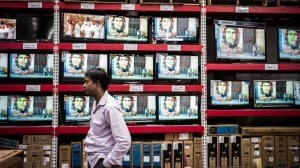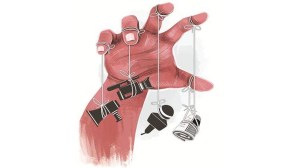The Call Centre Drawl
The airwaves have exploded with television news. Red-lipped adolescents are excitedly reading out headlines. A mindless American accent is d...

The airwaves have exploded with television news. Red-lipped adolescents are excitedly reading out headlines. A mindless American accent is discernible. 8220;Let us now do a rrap of the day8217;s news.8221; The word 8220;like8221; is incessantly used. 8220;Now8230; like8230; ah8230; like8230; is there8230; like8230; a8230; parallel to this?8221; Switch to FM radio and DJs are screaming a strange word: 8220;Haylayowh!8221; Hello! 8220;Hee-urrr here are some fahn fahn fine fine saangs songs.8221; What is this new language that the youth are speaking? It has been described as 8220;the Call Centre Drawl8221;. Call centres, as is well-known, are new giant telephone exchanges where thousands of young girls and boys are taught to speak in American accents so that they may answer telephone calls from American credit card holders pretending they are 8220;Jack8221; and 8220;Jill8221; instead of Thomas Kutty or Harminder Kaur. For American companies answering credit card inquiries in India costs far less than paying for an American operator sitting on American soil.
There can be no possible argument against call centres. They provide employment, salaries and facilities to youth who might otherwise be unemployed. But it would be sad if the Call Centre Drawl became the only hallmark of future Indian westernisation. After all, there8217;s a lot more to learn from the language of Mark Twain than simply a bizarre accent.
Before an analysis of the Call Centre Drawl, a few words on that inflammatory subject: westernisation. Throughout our recent history, many Indians have spoken in westernised accents. In fact westernisation, as Amartya Sen once said, is the central cultural predicament of our times. Nehru spoke like an Englishman. So did Gandhi, who often said that Tolstoy and Shaw were among his favourite writers. Early nationalists like Dadabhai Naoroji and Surendranath Banerjee were deeply westernised. Aurobindo Ghose, who later became Sri Aurobindo and sage of Indian philosophy, was former head boy at St Paul8217;s School in London, scholar at King8217;s College, Cambridge, and during the Alipore trials of 1908 it turned out that he was a university contemporary of one of the British magistrates. Jotirao Phule, regarded as the father of social reform in western India, precursor of Ambedkar, was as shown by Rosalind O8217;Hanlon in her superb biography profoundly influenced not only by the ideas of the Christian missionaries but also by the ideas of the European Enlightenment. Novelist Munshi Premchand8217;s BA degree was in English and history not Hindi, mind you. Tagore was bilingual in English and Bengali and the liberal reformist ideas of Raja Rammohan Roy and G.K. Gokhale came from a creative intercourse of India and the West. Thus 8220;westernisation8221;, the favourite whipping boy of Messrs Togadia and Thackeray, has actually resulted in social change and reform.
It could even be argued that the fear of westernisation is quite unfounded because most people grow out of MTV and fiercely return to their bharatiya roots and the Upanishads as soon as they hit forty. Just look at Protima Bedi. Or writers like Michael Madhusudan Dutt, for whom westernisation actually spurred a rediscovery of Bengali.
Apart from ideas, many so-called quintessentially 8220;desi8221; foods are in fact Western imports. 8220;Chchana8221;, or the cottage cheese used to make rasgulla, came from the French settlers in Chandannagore. It was the Jesuits who taught the Goans the art of grafting mangoes. The Portuguese may have taken away spices and gold from India but in return they brought tobacco, pineapples, papaya, cashew. Chilli, the chief ingredient of desi food, was actually brought to India by the Portuguese from South America. So next time Pravinbhai whips up a storm about foreigners we can simply remind him that lal mirch is as much a foreigner to India as the Christian missionaries! Since foreign-ness in India is a virtual misnomer, so why should we worry about the Call Center Drawl?
Simply because there is a difference between good westernisation and bad westernisation. Newer generations do not seem to be getting the best of the West. Instead of speaking a correct language any correct language, they8217;re speaking some sort of weird mishmash which nobody understands. Why are newer generations being imprisoned in the Call Centre Drawl? Precisely because there is a perverse refusal to accept that English and western education is a massive global asset and urgent steps should be taken to see that English is as efficiently and as universally taught as it should be. HRD Minister Murli Manohar Joshi repeatedly laments that English is only the language of a tiny percentage. But would India8217;s software revolution have been possible without knowledge of English? No wonder the Chinese are undertaking mass English-education programmes. Mulayam Singh Yadav once vowed to drive English out of India. Yet all he drove out of India was his own son and that, too, to a university in Sydney. Laloo Prasad Yadav mimics the English-speaking elite but ensures that his children get the best public school education possible. An elaborate hypocrisy surrounds English as politicians mouth the virtues of Hindi yet rush to English language TV studios for acceptance from the babalog.
So let8217;s shed the cant and hypocrisy about English and raise the standards of its use because it is language which, in a nation of bounding aspiration, is a tool of upward mobility. Dalit writers like Kancha Ilaiah are pleading for mass English language primary schools for dalits. There are English-speaking courses springing up in every small town. And yet the self-righteous literati persists in sneering at English even as their children flee to Oxbridge and insists on restricting its access to the upper castes on the pretext that the 8220;masses8221; need to wallow in their 8220;authentic vernaculars8221;.
The challenge for our times is surely not to roll back a competitive advantage like English but to use westernisation as creatively as Phule, Aurobindo and Gandhi to change society and spur individual excellence. It would be tragic if in the quest for some demented nativism of the Togadia variety we consigned future generations to only speaking like American telephone operators.
- 01
- 02
- 03
- 04
- 05































